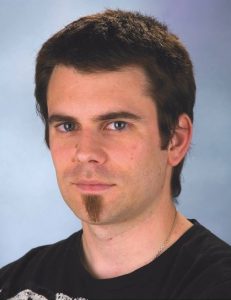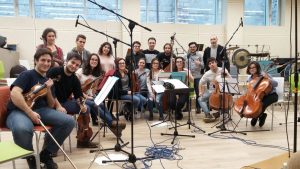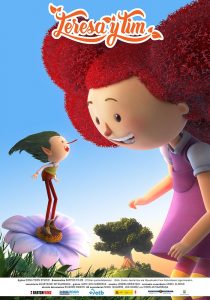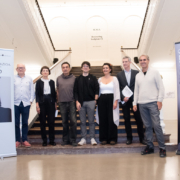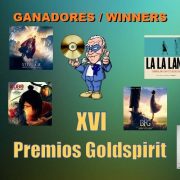Joseba Beristain – Interview
Hello Joseba! Kaixo Joseba!
First, thank you very much for finding a moment between projects to answer a few questions from SoundTrackFest.
My pleasure! Thank you very much for the opportunity you’re offering me.
As we have said on other occasions, this is an interview that we’ve had pending for some time, and the truth is that now, with your new animated film about to be released (“Teresa and Tim”), it seemed the right time to do it.
Yes! So we can take the opportunity to discuss more ideas and projects. It’s a good excuse, don’t you think?
The first question is quite typical, but it is a compulsory question. How are your beginnings in the world of music? And how do you decide you want to be a film music composer? Is there any particular moment you remember that you said … this is what I want do!
I was born in Azkoitia (Gipuzkoa – Spain) some years ago, and I have lived in a very musical family atmosphere. Almost all family members have ability for music, both my father’s family and my mother’s family. Although not a in a professional way, many of them play an instrument or sing. For example, my grandfather was deputy director of a band and composer of many pieces for the band. So, let’s say that music came naturally to me, could be felt in the air.
When I was 6 years old, as many of the kids my age, I started going to music theory and piano classes. Although I liked it, it was something that I “had” to do: it was not vocational yet. It was not until the early years of adolescence when I realized that music was central in my life and in my interests; it was something special, and what better way to channel that interest than assembling a group?
So that’s what I and some friends did, assemble a Rock-Folk group imitating Sorotan Bele, a very famous group at the time of the area where we lived. And that’s how I took my first steps as a composer. But although the folk / pop / rock thing was attractive to me, instrumental and “transcendental” music attracted my attention; Mike Oldfield, Win Meterns, the instrumental songs of Mecano, Vangelis, etc … there was something in all that I was more interested than music with lyrics.
My interest in film and image also grew. I went to cinema every time I could (and I still do!). If Tarantino learned filmmaking working in a video store, I did it in the town cinema (*laughs*). I remember running out of the cinema and going home to play the music of films like The Piano (Michael Nyman) or Cliffhanger (Trevor Jones). I started to listen to more and more soundtracks, which I borrowed from several of my uncles that were film music fans. And when I realized, I was hooked!!
Today, it is not that I don’t find music itself attractive or interesting, but I imagine music more as an element that works with the image, and vice versa. And to answer your question, it is difficult to know whether there was a specific time when all this happened, but it was back in adolescence. If I’m not mistaken, it was Josefina Molina who said that throughout life, what we do is satisfy that teenager we were, and fulfill his/her project. And that’s what I’m doing!
Talking about your beginnings as a soundtracks composer, if I’m not mistaken, your first major project is a short in 2000, “History of Elam”. How do you get to that project? How do you deal with the composition of the music?
At that time I was groping my skills as filmmaker in the world of video, 3D and computer graphics (as you see I still kept trying different things, but always related to the audiovisual or technology world).
I made a non-narrative experimental short film that I had the opportunity to show to the artistic director of Dibulitoon, the producer of the short “History of Elam“. Regarding my animation short, he did not say much, but he liked the music so much, that he invited me to compose the soundtrack for his short film “History of Elam“. As the first soundtrack I was composing for someone else, I felt great excitement and at the same time, vertigo.
I combined what at the time seemed more interesting to me, especially considering the post-apocalyptic settings of the short; string sounds, choruses, electric guitars, heavy percussion, synths … and the music came out!
Reviewing it now, and taking into account the resources I had at that time (16 years ago!!), I’m happy with the result. In addition, it helped me to learn and check various things, but the most important of these was that indeed I was able to compose a soundtrack. (Although during the writing process, several times I asked myself… why did I agree to get into this!!)
And from there…
Then from there, once I knew what I wanted to do and that I could do it, I started looking for more projects. It is difficult to explain how to get new projects, but what I have clear is that the quality of the work you do, is the best presentation of yourself you can have, and who is still active (in every sense of life, not only composing) gets things happening.
Looking at your website, in the music section (link), you can see that you have many jobs in many different areas; advertising, documentaries, shorts, films …. Is there a genre that you feel more identified with when composing, or is any genre you think that suits you best??
Well I could not tell. Several directors and producers have told me that I have been called because I’m a versatile composer. I do not know if that’s what defines me, but it is true that I have done very different jobs: from epic music, rock music, minimalist, electronics, etc … music is something I like.
As I mentioned before, I think the music I have inside has a “transcendental” base (I wouldn’t know how to define it better) but without being epic or grandiose. At least it is not usually light or especially lively music.
I think that’s why I feel identified with minimalist music, for example, which is a style that has changed over the years, but that I feel very close to me. The four chords of the song “The Swimmer” by Max Richter from the soundtrack of the film Disconnected, or the three voices of Kalakan singing “Sagarra Jo“, practically a cappella, excite me more and I feel far closer from them than from big orchestras playing complex pieces.
From what I know, you’re a versatile musician who plays several instruments (guitar, flute, piano, bass and drums) and you even dare to sing! (Laughs). Tell us the story behind all this.
Well, with singing happens to me what happened to my grandfather, who was a good musician but his voice was not helping him (laughs). Yes, I like to sing but it’s not my stronghold, although there have been times I’ve done it (we’ll talk about that later!).
And the instruments, I think it is the result of an innate curiosity and a favorable environment: I started learning the piano with a piano that was restored and given to me by an uncle on my mother, flute was given to me by an uncle of my father, who also gave me albums of composers such as Wim Mertens and Karl Jenkins (Adiemus), the guitar with which I learned to play was an old guitar that was in sitting the house, and bass and drums, because as I’ve played in several groups, I ended up trying a little bit of every instrument.
But it really would be a bit pretentious of me to say I play all those instruments. It is true that I play them, but interpretation is not my forte and I am not particularly good at playing any of them. But every time I see videos of Hans Zimmer playing, I realize that is not essential to be a great performer to enjoy playing (laughs).
I think my greatest skill is precisely to compose for the image, not to be and interpreter. I think that after so many years watching movies and listening to soundtracks, I’ve fed my intuition enough. As the wise Juanjo Saez says: intuition is what we know, but we don’t know we know it. That’s why in my soundtracks I don’t record any instruments beyond the piano, because it is the instrument I play best and helps me to compose. The rest, if I can, I prefer to record them from people who are good players.
From what projects do you keep a special memory? Why?
Well, I find it hard deciding on one, because each project has its uniqueness and I keep a good memory of all of them. But if I have to choose one, I can say that the music I made for short Gartzela by Iban Lizarralde is one of my favorite for several reasons: because it was the first I recorded with real musicians (and that did not sound like a computer), because I knew the project from conception till the end (in fact, I participated in the recording of the film as Script guy), and because it meant my second Jerry Goldsmith Award nomination.
Is there any project that has been kept “in the shadows” and that you would like rescue for the public?
Well, no, I don’t think so. I’ve been very lucky that all the projects I’ve worked on have come to fruition and, at the same time, I’ve had very few rejected proposals. Directors tell me I usually find the musical tone the project needs quite fast. I like to think that it is because of the intuition that I mentioned earlier. What I do have are projects on a personal level that I hope someday can come to light. But for now, I’m busy composing for the audiovisual media.
And speaking of rescue, I guess that like many other composers, you have a lot of music that has not been published and that people will not be able to listen to (except on your website where you have samples of many projects). Have you thought about self-edit your music in digital platforms like Bandcamp? (Austin Wintory for example, uses to publish all his works there, doesn’t matter whether they’re small or large).
Well, so far I had not thought of it, because until recently I haven’t had the opportunity to make a film, and do not know to what extent it makes sense to edit music of short films (for the short duration of the OST). But now that I have several feature films, I will think about it. But it is not within my priorities. It is true that I would like it, so someday I’ll come back to it.
However, there is some music you have published; or rather I should say that you were commissioned to create it, for a commercial use in a music library, right? A music that has been quite successful, as it has been used in some well-known tourism ads. How was that project?
It was a very interesting project for several reasons. A company from Madrid that distributes library music (music of all types that you can buy to use in audiovisual, cinema, advertising, TV, etc.) contacted me through a mutual friend, because they wanted to expand their catalog with different types of music that currently could not be found in their music library format. And among other sounds, they were looking for something that had “Basque” sound (I write it in quotes, because people can understand different things when talking about “Basque” sound).
I composed 7 songs of various styles, but they had a Basque base sound, using mostly local instruments like alboka, txalaparta, etc. I contacted some of the best musicians in the area specialized in these instruments, and recorded them in Garate studio with Mikel F. Krutzaga. And for various reasons, I ended up recording the voices, not something I usually do. It was a great experience. Very gratifying. It was a pleasure to see people with so much talent playing my songs, and the result was even better than what I imagined.
You can hear (and buy) all the songs on the following link: (enlace librería)
And indeed, it is one of my most successful works. For example, it was used in one of the videos from Visit Euskadi tourism campaign, which has been played 2 million times and has been shared 50,000 times on Facebook (Facebook link). It’s a big number!! And recently, as a curiosity, that music has been also used in a Spanish reality show “Farmer Wants a Wife” (laughs).
Making of:
“Visit Euskadi” video with my music:
Now a tricky question. Pretend I’m a producer / director who needs a composer for his new project. Why should I hire you? Convince me!
(Laughs) I’m feeling tense! Well, I think when hiring a person for any job there are several things to consider. The first is the quality of work (although this may be something subjective).
Whatever the quality of your work, you have to be consistent with the type and size of the project. The person who hires you doesn’t do it for what he/she imagines you can do, but for what he/she knows you can do. And I do not circumscribe strictly to the musical aspect; the narrative capacity of the composer through his music is probably the most important. That’s why I said earlier that the last job you do is your best cover letter for the next job. I think all the works I’ve completed have been well considered in the audiovisual project for which they have been composed.
There is another important part and it’s how easily you work in a team project. No matter how good a composer, if working with him is difficult, because he has a big ego, or because he is very stubborn or any other reason, fewer directors will want to work with him. I have very clear that the composer has to be a facilitator who has to be at the service of the movie, after the director and finally after himself. He is a member of the team that makes the film possible, and has to understand that making a film is a project of great complexity and risk, that involves many factors and so he must know how to adjust to the reality that he’s living in every moment.
This includes knowing how to deal within deadlines and budgets, to be autonomous, to commit to the project, being able to delivering mockups, being able to ensure smooth communication with the director / producer, fulfill his commitments, etc. I think I go into this category of facilitators.
And last but not least, is the fact of being able to connect with the director, having an understanding and complicity. This implies that the composer knows the film, is capable of reaching an understanding with the director / producer, who can talk about films and directors they like and why they like them, film shots, scripts, production strategies, distribution, whatever is related to the project. This fact seemed so important to me, that besides the background I could have before, a while ago I participated for two years in a screenwriting workshop at Larrotxene film school in San Sebastian, to know the insides of film narrative. Film world is one of the things that I like most, and I think that it can be seen in the work I do. Both of us, the director and I, we have a deep and strong desire to make movies.
Well, what do you say? Would you hire me? (Laughs)
You have participated in several editions of the Jerry Goldsmith Awards organized by BSOSpirit association, being nominated 3 times if I’m not mistaken. Tell us about your experience in these awards, and the opinion you have of film music festivals, that seem that are beginning to attract more and more public.
Award nominations are something that you have to take with certain relativity (even if it’s hard for me!!) because as Marge Simpson says, someone who does not know you, thinks you’re better than someone else doing something (laughs). But let me tell you the truth: the 3 times I have been nominated for the Jerry Goldsmith Awards I was really excited, especially the latter, which was for the soundtrack of a feature film. Also being nominated means the possibility go to and meet more people, guests composers of the festival, other nominees, etc… and this always seems a great incentive.
The predisposition is another thing, and it is always a joy to be nominated. Also, I have almost always been nominated alongside fellows I admire and appreciate, so the joy is even greater. But even with all this, someday I want to be the one who gets the award, and not the one who appreciates and admires the partner that gets the award!! (laughs)
As for festivals, it is great there’re more and more initiatives. The only drawback I see is that it forces me to choose because I find it physically impossible to go to all of them (laughs). But I have to say, agreeing with the opinion of Conrado Xalabarder, that in such events you have the risk of staying in the musical part of the work of the composer of the soundtrack, leaving aside the narrative work, which should be the main idea.
But on the other hand, it is somewhat understandable; film music, as virtually anything, is something multidimensional, where every person is getting from the approach he/she wants (or can). Some will focus on music, others in the narrative, and others on the part of the anecdotes and jokes.
For me, both professionally and personally, the festival organized by BSOSpirit (Ubeda-Cordoba-Malaga) has been a turning point in my perception of film music and in my approach to it as an amateur and a professional. And this is thanks to the people I’ve met in these festivals, people like Conrado Xalabarder, composers of national and international reputation (Michael Giacchino, David Arnold, Abel Korzeniowski, Fernando Velázquez, Pascal Gaigne, etc.) and peers who I have been growing together with, each at our own pace, making our way like: Ivan Palomares, Marc Timon, Dani Trujillo, Hector Marroquin, Julie Reier, Aritz Villodas, Zeltia Montes, Jesus Calderon, Isabel Latorre and many more who would not fit in this interview.
I’m sure I would not be the same if they I had not met them and if I had not lived so many wonderful moments in these festivals.
This spring you have completed the soundtrack for the film “The Plot Point”, which has a suffocating, oppressive, and disturbing music, like its history. How do you get to this project? What can you tell us about the music, its structure, its development and the composition process?
I came to this project, as I it usually occurs, through other project (again, your work as your business cards). I made a promotional music video for the Basque Country film school. The editor of this spot (Jose Miguel Villalta) was the film editor of The Plot Point. When he listened to my music, he thought I was a good candidate to compose the soundtrack and proposed my name to the director Elbio A. Nielsen, and one meeting later I was already in the Project!
The music is divided into three blocks: the music that accompanies Jones, that is a very ethereal music based on a female voice and pads and synthesizers, the music that accompanies Ana, a more transcendental music based on piano and strings mainly, and a third block of music to tell other parts of the story (I can’t say more, no spoilers).
The narrative and stylistic treatment of each block is different, and is what makes this soundtrack somewhat peculiar. Distances apart, of course, it is somehow like some soundtracks of Max Richter, interspersing songs with real instruments and synthesizers.
The creative process was guided by temp-tracks, which had been placed by the editor of the film himself. Temps-tracks, that had been famous lately regarding music on films Marvel, are a double-edged sword: help you understand and visualize some things, but in turn can kill the creativity of the composer. I think this time it functioned more as the first choice; as there were elements that helped the director and me understanding better what the film needed.
From there, I had total freedom to compose, but under some assumptions, where the most importants were subtlety and restraint. And in fact, the containment part was the most difficult. But I think in the end I found the place and ended with a very balanced soundtrack.
In addition, this weekend, a new film with your music has been premiered, “Teresa and Tim” (“Teresa eta Galtzagorri” in Euskara) a children’s animation film, in Spanish and Euskara languages. What can you tell us about your music? What has been the approach you have used for this work?
The film is produced by Dibulitoon, as it was the first short film for which I composed the music, History of Elam, so with this project I was partly back to my beginnings but from a different vital and musical position. I like this idea! For “Teresa and Tim”, that is a film aimed for children, the director, Agurtzane Intxaurraga, did not want to make a movie with the typical treatment for children with a lot of movement, shock, easy humor, etc. but she wanted to treat the story and characters, as well as the rest of the elements of the film, from a more natural point of view, in a more realistic way (in my opinion, a wise decision).
And music remains consistent with this idea because it is made more like a drama and not like a children’s film: there is hardly synchronization or mickey-mousing, there is a constant use of music as a filling element, and music does not accompany the physical movements of the characters. The soundtrack is structured around a song, which is the song of friendship between the two protagonists: Teresa, a girl of 6 who feels displaced by the birth of his brother Jon, and Tim, a spring goblin that is not comfortable with the rest of his goblin brothers.
Around this main theme there are several other main themes: one for Vlad, the trader that aims to capture Tim, and one for Sam, Vlad’s assistant who is trapped in a relationship of submission. Since much of the film is set in the circus world and some passages have a joker feeling, this has given me the opportunity to compose symphonic music but also more varied music, resulting in a soundtrack that interleaves different styles.
Finally, tell us something about your upcoming projects, what can we expect from Joseba Beristain in the next months?
I tend to be cautious with these things and now I don’t dare to tell you much. I can only say that I hope that next year we can do another interview talking about more soundtracks for several films that, again, if confirmed, will be different from what I’ve done so far. Quite different I would say.
Thank you very much for your time Joseba. Good luck with the film and good luck with your upcoming projects!
Thank you very much to you, SoundTrackFest, for the opportunity of this interview and your work to spread film music. Keep the good work with your web!
Interview by Gorka Oteiza


